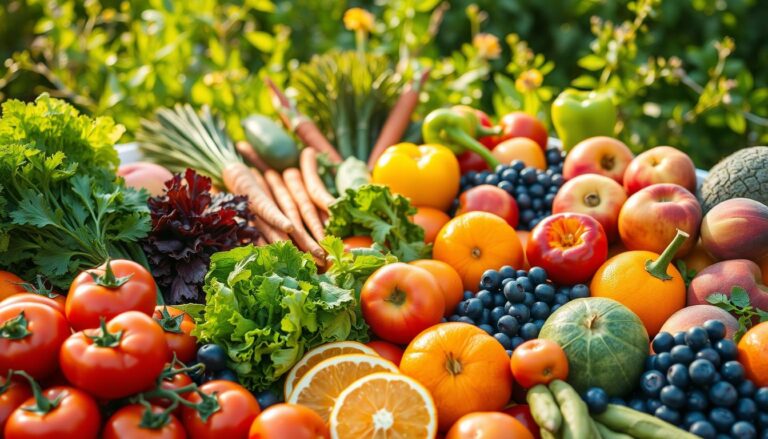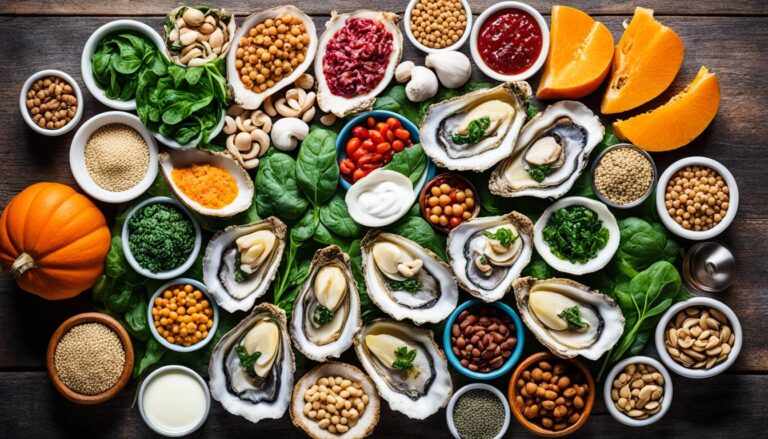How does diet impact muscle gains? What diet changes can help reach fitness goals like body building? A good diet is key for muscle growth and recovery. It provides the needed nutrients and calories.
A good diet is vital for muscle growth and fitness. It fuels the body to build and repair muscle. This is essential for muscle gains and fitness.
Key Takeaways
- A well-planned diet is essential for muscle growth and recovery, and is a key component of any fitness or body building regimen.
- Calorie intake macronutrient distribution, and meal timing are critical factors in a muscle-building diet and should be carefully considered when planning a diet for muscle gains.
- A balanced diet that includes protein complex carbohydrates, and healthy fats can help support muscle growth and overall fitness, and is essential for achieving muscle gains.
- Proper nutrition is essential for muscle recovery and growth, and can help individuals achieve their fitness goals whether it’s building muscle losing weight or improving overall health.
- A good diet can help individuals maximize their muscle gains and achieve their fitness goals, particular in body building and muscle growth.
- Understanding the importance of diet and nutrition can help individuals make informed decisions about their fitness and body building regimen, and can help them achieve their goals more effectively.
- A well-planned diet can help individuals maintain a healthy and balanced lifestyle, which is essential for overall health and wellness, and can help support muscle growth and fitness.
What Diet is Best for Muscle Gain? Understanding the Basics
For muscle gain a good diet is key. A diet focused on weight loss might not work well because it cuts calories. This can slow down muscle growth. Instead eat foods rich in nutrients and enough calories.
A workout plan that fits your goals is also important. A diet full of protein complex carbs, and healthy fats helps build muscle.
To make a great diet plan learn about nutrition basics. This means figuring out your daily calorie needs and how to balance your macronutrients. Also plan your meals to match your workout schedule for best results. Here are some key points:
- Calculate daily calorie needs based on your fitness goals and activity level
- Focus on a balanced diet that includes protein complex carbohydrates, and healthy fats
- Time meals to coincide with your workout routine to optimize muscle growth
https://www.youtube.com/watch?v=bSzy6CIjktY
By following these tips and planning your diet well, you can reach your muscle gain goals. Always drink plenty of water and pay attention to how your body feels. Adjust your diet and workout as needed.
Essential Protein Sources for Muscle Development
Protein is key for a healthy diet, important for building and repairing muscles. It’s vital for muscle growth and recovery. So it’s a big part of nutrition.
A balanced diet with various protein sources is best for muscle building. Lean meats fish eggs dairy, and plant based foods like legumes and nuts are great. They give protein and important vitamins and minerals for health.
To get enough protein figure out your daily needs and spread it out. Aim for 1-1.5 grams of protein per kilogram of body weight each day. Eat 3-5 main meals and 2-3 snacks with protein-rich foods. Here are some good ones:
- Lean meats: chicken, turkey, and lean beef
- Fish: salmon tilapia, and cod
- Eggs: a great source of protein and essential vitamins and minerals
- Dairy: milk Greek yogurt, and cottage cheese
- Plant-based options: legumes nuts, and seeds
Eating these protein sources helps with muscle growth and recovery. They also give you the nutrients you need for health. By choosing the right foods you can improve your diet for muscle building and overall health.
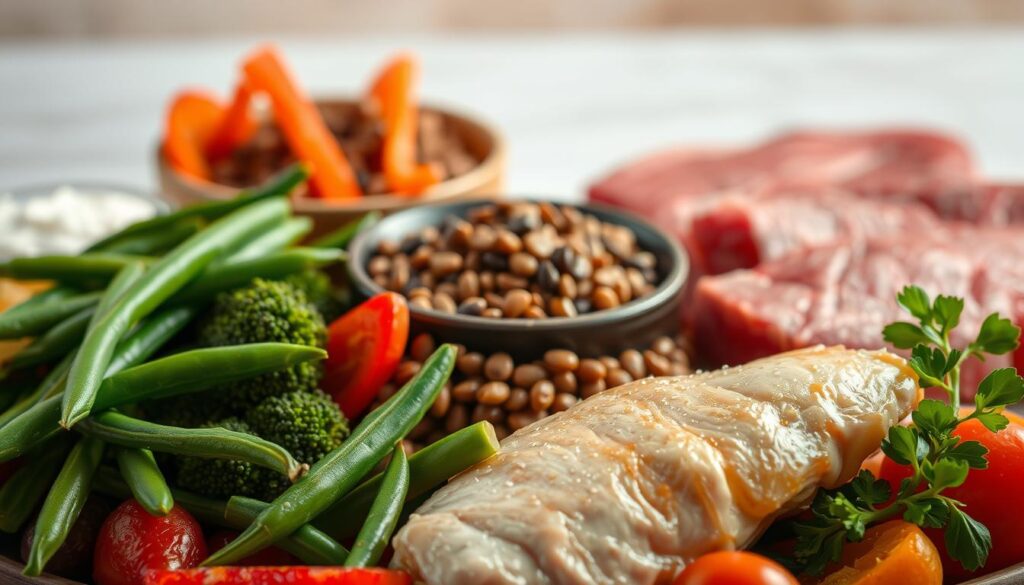
Read more: What to eat gain muscle at 50?
Complex Carbohydrates Fueling Your Muscle Growth
Complex carbohydrates are key for muscle growth and recovery, mainly in exercise and gym life. They give us energy for workouts and help muscles grow. When we do intense activities like weightlifting carbs turn into glucose and fuel our muscles.
A good gym life plan needs carbs, protein, and healthy fats in balance. Foods like whole grains, fruits, and veggies give us lasting energy and help muscles work well. Great carb sources for exercise fans are brown rice quinoa sweet potatoes, and whole-grain bread.
Timing carbs is important, based on the exercise type and fitness goals. Eating complex carbs 1-2 hours before working out gives us energy and supports muscles. After exercising, carbs with protein help muscles recover and grow.

The daily carb needs vary by fitness goals and gym life routine. Generally, people doing exercise need 2-3 grams of complex carbs per kilogram of body weight daily. Eating a variety of whole foods gives us the carbs we need for muscle growth and recovery.
Healthy Fats and Their Role in Muscle Building
Many people focus on protein and carbs for muscle growth, but forget about healthy fats. Yet, they are key for hormone production and health. They are essential for a balanced diet.
Nuts, seeds, avocados, and olive oil are great sources of healthy fats. They can be added to a muscle building diet. For instance nuts and seeds in oatmeal or yogurt boost healthy fats for muscle growth.
Here are some ways to add healthy fats to your diet:
- Add nuts and seeds to oatmeal or yogurt
- Use olive oil for cooking and dressings
- Include avocados in salads and smoothies
Healthy fats are vital for hormone production health, and muscle growth. A diet rich in healthy fats protein, and carbs helps reach muscle-building goals.
Meal Timing and Frequency for Maximum Gains
Proper meal timing and frequency are key for fitness and body building. A well-planned diet boosts muscle gains and supports health. It’s important to match meals with the body’s natural rhythms and workout times.
Eating 5-6 meals daily, with 3 main meals and 2-3 snacks fuels the body. This helps muscle growth. Adjust this based on your needs and activity level. Body builders might need more meals for enough nutrition.
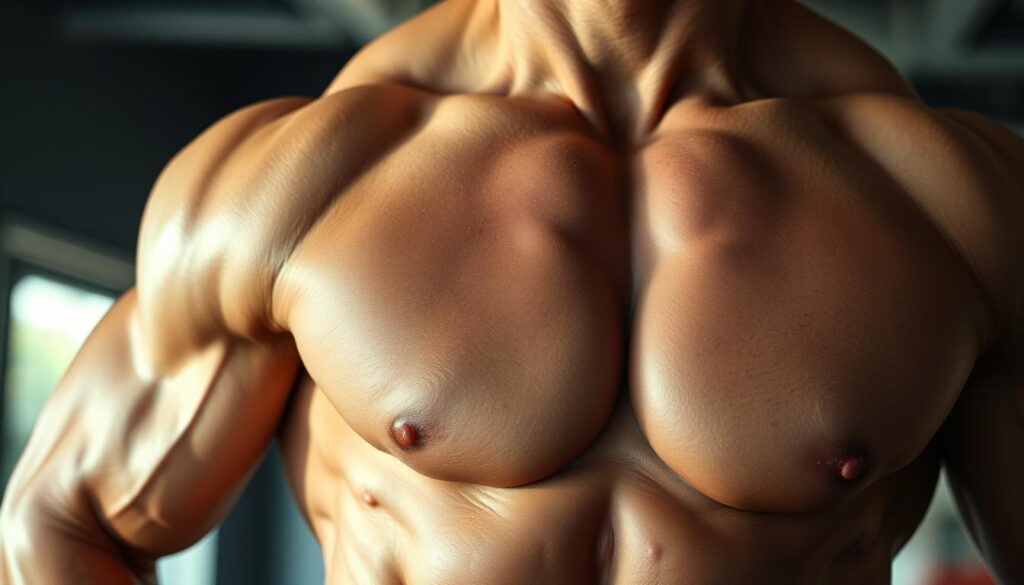
Read more: Muscle Saving Weight Loss Meds
Eat a meal or snack 1-2 hours before working out. Then eat again 30-60 minutes after. This gives energy and aids in muscle recovery. Eating at night also helps the body recover and rebuild muscles while you sleep.
Pre-Workout Nutrition Window
The pre-workout window is vital for energy and muscle function. A meal or snack with carbs and protein fuels your workout.
Post-Workout Recovery Meals
After working out, eat something with protein and carbs. This helps with muscle recovery and growth. It also reduces soreness and promotes muscle rebuilding.
Nighttime Nutrition Strategy
A good nighttime meal includes casein protein and complex carbs. It provides nutrients slowly during sleep. This supports muscle recovery and growth.
Supplements That Support Muscle Growth
Building muscle needs a good workout and healthy eating. But, supplements can also help a lot. It’s key to pick the right ones to match your diet and exercise.
Effective muscle-building supplements include protein powder creatine, and HMB. They boost muscle mass, strength, and endurance. Here’s what they do:
- Protein powder: boosts muscle protein synthesis, aiding in growth and repair
- Creatine: increases muscle strength power, and endurance for tougher workouts
- HMB: reduces muscle damage and soreness, aiding in quicker recovery
Adding supplements to your diet is good but don’t forget to eat healthy too. A balanced diet, regular exercise, and the right supplements can help grow muscles and improve health.
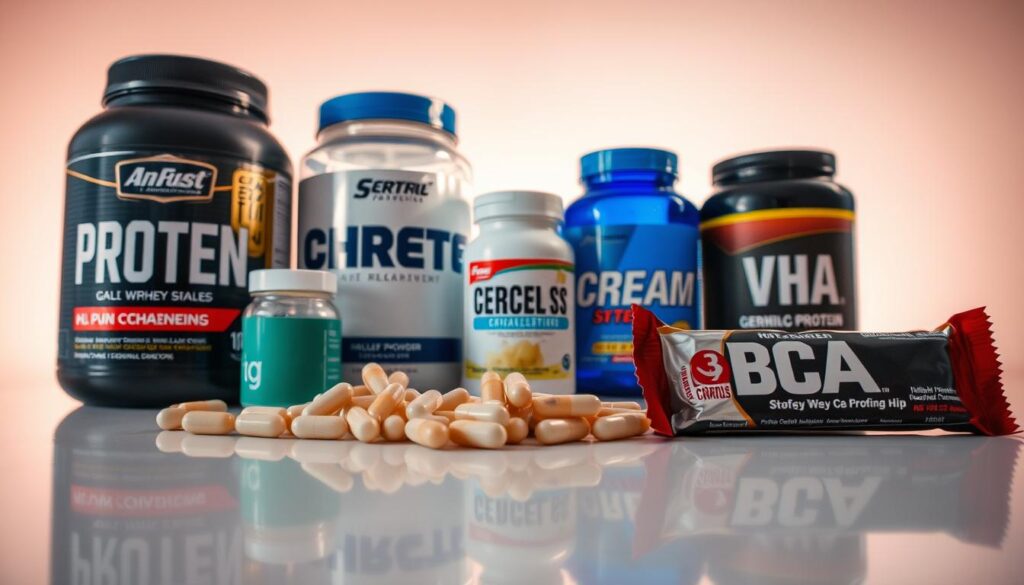
Hydration Strategies for Muscle Development
Drinking enough water is key for growing muscles and staying healthy. Good hydration helps you get the most out of your workouts and nutrition. It also helps move nutrients to your cells and gets rid of waste.
There are a few important things to think about when it comes to staying hydrated. These include:
- Drinking enough water throughout the day to stay hydrated
- Monitoring electrolyte levels to ensure balance
- Timing hydration around workouts to optimize performance and recovery
The usual advice is to drink at least eight glasses of water a day. But, this can change based on how active you are and where you live. Keeping an eye on your electrolytes is also important. They help control how much water is in your body and support many body functions. By focusing on hydration and nutrition, you can make big strides towards your health and fitness goals.
Common Dietary Mistakes to Avoid
Building muscle needs a good diet. Many people make mistakes that stop their muscle growth. A balanced diet with the right calories, macronutrients, and water is key.
Some common mistakes to avoid include:
- Not eating enough calories, which can cause muscle loss and lower fitness
- Not getting the right mix of macronutrients, which affects muscle growth and recovery
- Not drinking enough water leading to poor performance and muscle cramps
To avoid these mistakes, plan your diet carefully. Include the right foods and stay active. A healthcare professional or dietitian can help with this.
A good diet has protein, complex carbs, and healthy fats for muscle growth. Drinking lots of water is also important. By avoiding these mistakes and planning well, you can reach your muscle-building goals and stay fit.
Conclusion Creating Your Personalized Muscle-Building Meal Plan
Starting your body building journey means making a personalized nutrition plan. Knowing how to eat right is key to growing muscle. You need to understand the basics of a muscle building diet to make a plan that fits you.
First, figure out how many calories you need each day. This depends on how active you are and what you want to achieve. Then split your food into protein, carbs, and fats. This mix helps your muscles grow and recover.
Make sure to eat at the right times, like before and after workouts. This helps your body use the nutrients best. Sticking to your diet and avoiding common mistakes is important for success. This guide will help you build the strong body you want. Use this knowledge to make your own meal plan and start your journey with confidence.



